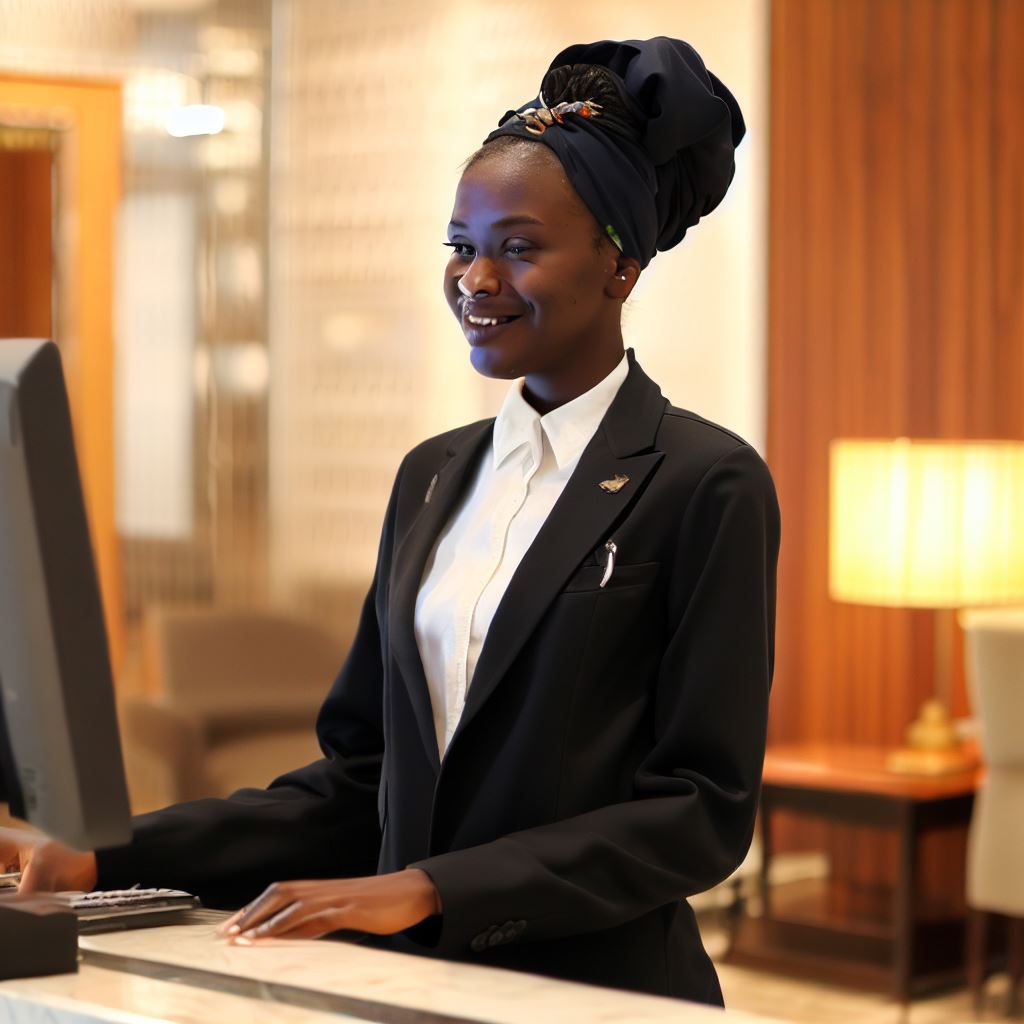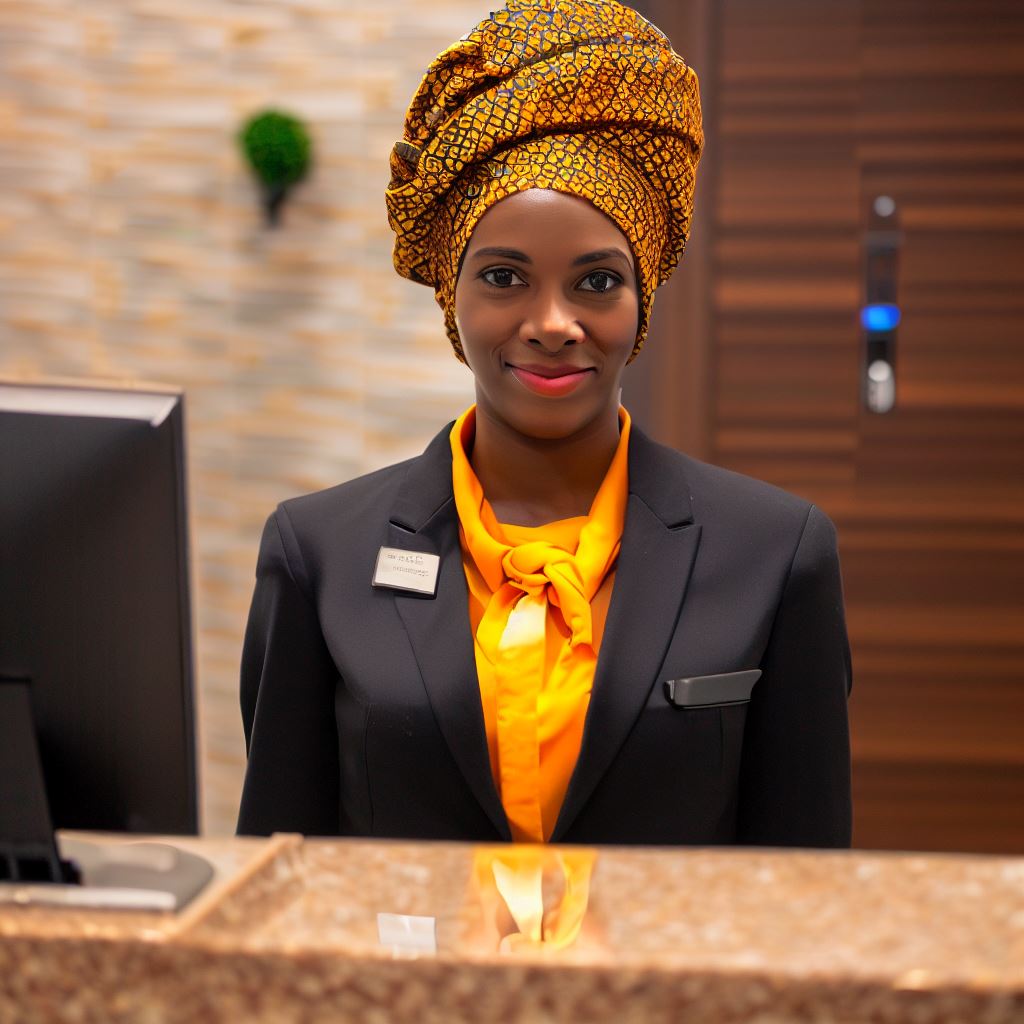Introduction
A hotel receptionist is an essential figure in the hospitality industry, responsible for ensuring that guests have a pleasant and smooth experience during their stay.
This blog post serves as a comprehensive guide for beginners on hotel receptionist etiquette.
Importance of hotel receptionists
Hotel receptionists are the first point of contact for guests, making them crucial in forming guests’ first impressions of the hotel.
Their professionalism and etiquette can greatly impact the overall guest experience.
Purpose of the blog post
The purpose of this blog post is to provide beginners in the hotel receptionist role with a detailed and practical guide on proper etiquette.
It aims to equip them with the knowledge and skills needed to excel in their position and leave a positive impression on guests.
Thesis statement
This blog post serves as a comprehensive guide for beginners on hotel receptionist etiquette, providing valuable insights and tips for excelling in this role.
Dress Code and Appearance
As a hotel receptionist, your appearance and dress code play a crucial role in leaving a positive impression on guests.
Dressing professionally shows your commitment to your role and helps maintain the hotel’s professional image.
Professional attire
A professional attire contributes to a welcoming and formal atmosphere.
It instills confidence in guests that they are in capable hands.
It is important to choose clothing that aligns with the hotel’s brand and reflects a polished and put-together look.
When selecting your attire, consider comfort as well.
While looking professional is essential, it’s equally important to wear clothes that allow you to perform your duties efficiently.
Ensure your chosen attire is clean, properly ironed, and fits you well.
However, be mindful not to dress too casually or in a revealing manner, as it may create the wrong impression.
Whether it’s a suit, a dress, or a uniform, make sure it adheres to the hotel’s guidelines and presents a professional appearance.
Well-groomed appearance
In addition to your clothing, maintaining a well-groomed appearance is equally vital.
Follow a regular hygiene routine, including showering, washing your hair, and using deodorant.
Keep your nails clean and trimmed, and maintain fresh breath by practicing good oral hygiene.
Men should either be clean-shaven or keep their facial hair well-groomed and neatly trimmed.
Women should avoid excessive makeup and ensure their hair is neatly styled.
A polished and well-groomed look reinforces your professionalism and attention to detail.
Wearing name badges or identification
Finally, always wear your name badge or identification when on duty.
This simple accessory helps guests easily recognize you as a hotel staff member and facilitates communication.
Make sure your name badge is clean, prominently displayed, and includes your name and position.
The act of wearing identification demonstrates your commitment to delivering excellent customer service.
It enhances guest confidence and makes it easier for them to approach you with any queries or concerns.
Not wearing your identification may make guests feel uncertain about who to approach, leading to a less satisfying experience.
Basically, maintaining a professional dress code and appearance as a hotel receptionist is crucial in creating a positive and welcoming environment for guests.
By adhering to the guidelines, dressing appropriately, and wearing identification, you contribute to the overall guest experience and elevate your professionalism as a receptionist.
Read: A Day in the Life of a Hotel Receptionist in Nigeria
Communication Skills
Greeting guests with a warm welcome
- As a hotel receptionist, your first communication with guests sets the tone for their entire stay.
- Always greet guests with a warm and sincere welcome, using their names if possible.
- Maintain eye contact and have a friendly facial expression to make guests feel valued and important.
- Offer assistance and ask if they need any information or help with luggage.
- Creating a positive first impression through your warm greeting can enhance guest satisfaction and loyalty.
Active listening and empathy
- Active listening involves fully concentrating on what the guest is saying, without interrupting or judging.
- Give guests your undivided attention, nod to show understanding, and ask relevant questions to clarify their needs.
- Empathy is crucial in understanding and relating to the guest’s emotions and needs.
- Show empathy by acknowledging their concerns, offering empathy statements, and providing appropriate solutions.
- Active listening and empathy create a sense of trust and care, enhancing guest satisfaction and loyalty.
Effective verbal and non-verbal communication
- Verbal communication involves using clear and concise language to convey information effectively.
- Speak politely, maintain a moderate pace, and avoid using jargon or complex terms that may confuse guests.
- Use positive and friendly tone, ensuring your words reflect professionalism and a desire to assist.
- Non-verbal communication includes body language, facial expressions, and gestures.
- Maintain an open and welcoming posture, smile genuinely, and use appropriate hand gestures to enhance communication.
- Be mindful of your non-verbal cues as they can greatly impact the guest’s perception of your service.
Communication skills are vital for hotel receptionists to provide exceptional guest experiences.
By greeting guests warmly, actively listening and showing empathy, and using effective verbal and non-verbal communication techniques, receptionists can create a positive and welcoming atmosphere.
These skills foster guest satisfaction, build trust, and contribute to the overall success of the hotel.
Remember, as a hotel receptionist, you are the face of the establishment, and your communication skills play a key role in guest satisfaction and loyalty.
Read: Key Skills Needed for a Hotel Receptionist in Lagos
Phone Etiquette
Answering calls promptly and professionally
Answering phone calls is an essential part of a hotel receptionist’s role.
It is crucial to answer all incoming calls promptly and professionally.
This ensures that guests have a positive first impression of the hotel and feel valued.
To answer calls professionally, a receptionist should strive to be polite and friendly.
Greeting the caller with a warm and welcoming tone sets the right tone for the conversation.
It is important to provide the hotel’s name along with a friendly greeting, such as “Good morning, thank you for calling Goodday Hotel, how may I assist you today?”
Additionally, it is essential to pick up the phone within the first few rings.
This shows that the hotel values its guests’ time and is eager to provide assistance.
A prompt response enhances the overall guest experience and portrays the hotel in a positive light.
Active listening and taking accurate messages
Active listening is another crucial aspect of phone etiquette for hotel receptionists.
It involves paying full attention to the caller’s needs, questions, and concerns.
By actively listening, receptionists can provide the best possible assistance and ensure that guests feel heard and understood.
When taking messages, receptionists should gather accurate and detailed information.
This includes the caller’s name, phone number, reason for the call, and any specific requests.
Writing down the message neatly and clearly is important to avoid any misunderstandings or confusion later on.
Accuracy in message taking helps to maintain effective communication within the hotel and ensures that guests’ needs are met efficiently.
Proper telephone techniques
Having proper telephone techniques is essential for a hotel receptionist to effectively handle calls and provide excellent customer service.
These techniques include:
- Using a polite and professional tone: Speaking clearly and enunciating words helps ensure that callers can understand the receptionist easily. A polite and professional tone conveys respect and professionalism.
- Managing multiple lines: Receptionists often have to handle multiple calls simultaneously. They should prioritize calls and be able to place callers on hold or transfer them to the appropriate department if necessary.
- Remaining calm and composed: Dealing with irate or demanding callers can be challenging. It is crucial for receptionists to remain calm, patient, and professional, even in difficult situations. Listening empathetically and offering appropriate solutions can help de-escalate tense situations.
- Ending calls politely: Whenever a call is concluded, a receptionist should thank the caller and bid them farewell. Ending calls on a positive note leaves a lasting impression and contributes to excellent customer service.
By following these phone etiquette guidelines, hotel receptionists can effectively manage phone calls, ensure excellent customer service, and contribute to a positive guest experience.
Read: The Salary Guide for Hotel Receptionists in Nigeria
Guest Handling
Displaying a positive attitude
- Always greet guests with a warm smile and a friendly tone of voice.
- Show enthusiasm and genuine interest in the guests’ needs and concerns.
- Be approachable and create a welcoming atmosphere for guests.
- Display confidence and professionalism in handling any guest requests or issues.
- Make sure to maintain a positive demeanor even during challenging situations.
Being patient and accommodating
- Listen attentively to guests and ensure their concerns are understood.
- Show empathy towards guests’ complaints or dissatisfaction.
- Apologize sincerely for any inconvenience caused and find a suitable solution.
- Be flexible and willing to make necessary adjustments to meet guests’ expectations.
- Stay calm and composed, even when faced with difficult or demanding guests.
Assisting guests with their needs and inquiries
- Provide prompt and accurate information about the hotel’s services and facilities.
- Guide guests in making reservations, checking-in, and checking-out smoothly.
- Offer assistance in arranging transportation, sightseeing tours, or restaurant reservations.
- Anticipate guests’ needs and be proactive in offering helpful suggestions or recommendations.
- Handle guest complaints efficiently, ensuring that resolutions are satisfactory for both parties.
Displaying a positive attitude
In the hotel industry, guest handling is paramount to ensuring a positive guest experience.
As a hotel receptionist, it is essential to display a positive attitude towards guests at all times.
This can be achieved by greeting guests with a warm smile and a friendly tone of voice.
A genuine interest in their needs and concerns will show enthusiasm and create a welcoming atmosphere.
Being patient and accommodating
Patience and accommodation are also crucial when handling guests.
It is important to listen attentively to their concerns and ensure that they are understood.
Showing empathy towards guests’ complaints or dissatisfaction and apologizing sincerely for any inconvenience caused will help maintain a positive relationship.
Being flexible and willing to make necessary adjustments demonstrates a commitment to meeting guests’ expectations.
Assisting guests with their needs and inquiries
Assisting guests with their needs and inquiries is an integral part of a hotel receptionist’s role.
Providing prompt and accurate information about the hotel’s services and facilities is crucial.
Guiding guests in making reservations, checking-in, and checking-out smoothly can enhance their overall experience.
Additionally, offering assistance in arranging transportation, sightseeing tours, or restaurant reservations demonstrates a commitment to exceptional service.
An effective receptionist should also anticipate guests’ needs and be proactive in offering helpful suggestions or recommendations.
This can include information on local attractions, dining options, or amenities that may enhance their stay.
By going above and beyond in anticipating and fulfilling guests’ needs, a receptionist can ensure a memorable and satisfying stay.
How to Handle Challenges
However, it is inevitable that hotel receptionists may encounter challenging or difficult guests.
In these situations, it is important for receptionists to maintain a positive demeanor.
They should remain calm and composed, actively listening to the guests’ concerns and finding appropriate solutions.
Handling guest complaints efficiently and resolving them in a satisfactory manner is crucial for guest satisfaction and loyalty.
Generally, guest handling is a fundamental aspect of hotel receptionist etiquette.
By displaying a positive attitude, being patient and accommodating, and assisting guests with their needs and inquiries, receptionists can create a welcoming atmosphere and ensure a pleasant stay for guests.
Effective guest handling skills are essential for a successful career in the hospitality industry.
Read: Hotel Receptionist: A Flourishing Career in Nigeria?

Problem-solving and Conflict Resolution
Dealing with difficult guests
- Listen attentively and empathize with the guest’s concerns or complaints.
- Stay calm and composed, avoiding any defensive or confrontational behavior.
- Gather all necessary information and details to fully understand the issue at hand.
- Offer sincere apologies for any inconvenience caused, regardless of who is at fault.
- Propose immediate solutions or alternatives to the guest to address their concerns.
- Provide clear explanations of policies, procedures, or limitations that may apply in resolving the issue.
- Involve relevant team members or departments, ensuring a coordinated approach to resolving the problem.
- Follow up with the guest to ensure their satisfaction and confirm that the issue has been resolved.
Staying calm and composed under pressure
- Practice deep breathing techniques to help maintain a sense of calmness and clarity.
- Remain focused on the present moment rather than getting overwhelmed by the situation.
- Adopt a positive mindset and remind yourself that you are capable of handling the challenges.
- Take short breaks whenever possible to recharge and refocus your energy.
- Seek support from colleagues or supervisors when needed, as teamwork can alleviate stress.
- Develop effective time management skills to avoid feeling rushed or overwhelmed.
- Maintain a professional demeanor, keeping emotions in check when faced with challenging situations.
- Learn from each experience, viewing pressure as an opportunity for personal growth and development.
Finding effective solutions
- Identify the root cause of the problem by gathering all necessary information and perspectives.
- Brainstorm potential solutions or alternatives, considering feasibility and guest satisfaction.
- Evaluate each option’s pros and cons, weighing the potential outcomes and risks.
- Communicate and collaborate with team members or departments to gather insights and advice.
- Choose the most suitable solution based on the information and resources available.
- Implement the chosen solution promptly, ensuring clear communication with all involved parties.
- Monitor the results and adjust as necessary, seeking continuous improvement in the process.
- Document the issue, solution, and outcome for future reference and learning purposes.
By following these guidelines, hotel receptionists can effectively handle and resolve various problems and conflicts that may arise during their interactions with guests.
Remember, problem-solving and conflict resolution are crucial skills within the hospitality industry, and mastering them will contribute to creating a positive guest experience and maintaining a professional reputation.
Multitasking and Time Management
Effectively managing check-ins, check-outs, and reservations
- Handle check-ins, check-outs, and reservations smoothly to provide a seamless guest experience.
- Ensure that the guests’ details are accurate and the room assignments are correct.
- Greet guests warmly and promptly attend to their needs during the check-in process.
- When handling check-outs, efficiently settle any outstanding payments and address any concerns the guests may have.
- Manage reservations by confirming guest details, updating any changes, and coordinating with other hotel departments.
Prioritizing tasks and handling workload efficiently
- Create a to-do list at the beginning of each shift, prioritizing tasks based on importance and deadlines.
- Focus on completing critical tasks first, such as attending to guests in-person or answering phone calls.
- Delegate non-essential tasks or seek assistance from colleagues to manage workload effectively.
- Stay organized by using tools such as checklists, calendars, and reminders to track and manage tasks.
- Avoid procrastination and maintain a sense of urgency when working to meet deadlines.
Maintaining a calm demeanor even during peak hours
- During busy hours, remain composed and maintain a positive and friendly attitude towards guests.
- Stay focused and avoid getting overwhelmed by prioritizing tasks and managing time efficiently.
- Practice active listening and effective communication skills to address guests’ concerns promptly.
- Take short breaks when necessary to recharge and prevent burnout, ensuring a consistent level of service.
- Utilize stress management techniques, such as deep breathing and mindfulness, to stay calm and composed.
Efficiently managing the various responsibilities of a hotel receptionist requires excellent multitasking abilities and effective time management skills.
By successfully carrying out check-ins, check-outs, and reservations, prioritizing tasks, and maintaining a calm demeanor, receptionists can provide exceptional service to guests and contribute to the smooth operation of the hotel.
As a hotel receptionist, mastering the art of etiquette is crucial for creating a positive and memorable experience for guests.
The topics covered in this guide will equip beginner receptionists with the necessary knowledge and skills to handle various situations with confidence.
By understanding the importance of body language, greetings, phone etiquette, and multitasking, receptionists can contribute to the overall success of the hotel and ensure the satisfaction of every guest.
Publish Your Professional Profile, Business or Brand
Showcase your expertise, gain trust, and boost visibility instantly on Professions.ng.
Publish NowRemember, a warm smile and a professional demeanor can go a long way in making guests feel welcomed and valued.
So, embrace these etiquette guidelines and excel in your role as a hotel receptionist!
Computer and Technology Skills
A hotel receptionist should possess a range of computer and technology skills to efficiently perform their duties.
These skills include:
Competence in hotel software and systems
- Proficiency in using the hotel’s specific software and systems is crucial for a receptionist to handle various tasks efficiently.
- The receptionist should be able to operate the front desk software, which includes checking in and out guests, making reservations, and managing room inventory.
- Having a solid understanding of the software’s features and functions will improve the receptionist’s productivity and customer service.
Familiarity with reservation management software
- A receptionist should be well-versed in reservation management software to handle guest bookings and cancellations.
- They should know how to input guest information accurately, assign suitable rooms, and check the availability of rooms in real-time.
- Maintaining an organized and up-to-date reservation system is essential for providing excellent customer service and ensuring a smooth check-in process.
Troubleshooting basic technical issues
- Being able to troubleshoot basic technical issues is essential for a receptionist to address and resolve any glitches that may arise.
- They should possess problem-solving skills to handle common issues such as printer malfunctions, network connectivity problems, or software glitches.
- A receptionist should know how to perform basic troubleshooting steps or contact the relevant IT support for prompt resolution.
Having strong computer and technology skills as a hotel receptionist not only allows for efficient workflow but also enhances the guest experience.
With these skills, a receptionist can easily navigate the hotel’s software, manage reservations effectively, and promptly resolve any technical issues that may occur during their shift.
Etiquette with Other Staff Members
Collaboration and Teamwork
- Foster a collaborative environment by actively working together towards common goals.
- Support and assist colleagues whenever needed, promoting a sense of unity and cooperation.
- Share ideas and expertise, encouraging a culture of continuous learning and improvement.
- Embrace diversity and value different perspectives, fostering innovation and creativity within the team.
Respectful and Courteous Behavior Towards Colleagues
- Treat colleagues with respect, regardless of their position or background.
- Be considerate of others’ feelings and maintain a positive and supportive attitude.
- Refrain from gossiping or speaking ill of colleagues, as it can create a toxic work environment.
- Show appreciation for the contributions of your colleagues and celebrate their successes.
Effective Communication Within the Team
- Communicate clearly and concisely, ensuring that messages are understood by all team members.
- Actively listen to your colleagues’ ideas and concerns, showing genuine interest and empathy.
- Be open to constructive feedback and strive to provide it in a respectful and constructive manner.
- Use appropriate channels of communication, such as meetings or emails, to share information effectively.
Collaboration and Teamwork
By following these etiquette guidelines with other staff members, you can contribute to a harmonious and productive work environment.
Collaboration and teamwork are essential for achieving shared goals, and by supporting and assisting your colleagues, you can foster a culture of unity and cooperation.
Embracing diversity and different perspectives can also lead to innovation and creativity within the team.
Respectful and Courteous Behavior Towards Colleagues
Respectful and courteous behavior towards colleagues is crucial for maintaining a positive work environment.
Treat all colleagues with respect, regardless of their position or background, and be considerate of their feelings.
Gossiping or speaking ill of colleagues should be avoided, as it can create a toxic atmosphere and erode trust among team members.
Instead, show appreciation for your colleagues’ contributions and celebrate their successes.
Effective Communication Within the Team
Effective communication within the team is essential for smooth collaboration and efficient workflow.
Clearly and concisely communicate your messages to ensure understanding among all team members.
Actively listen to your colleagues’ ideas and concerns, showing genuine interest and empathy.
Be open to receiving constructive feedback and provide it in a respectful and constructive manner.
Utilize appropriate channels of communication, such as meetings or emails, to share information effectively and keep everyone informed.
Essentially, etiquette with other staff members is crucial for maintaining a positive and productive work environment.
Collaboration, respect, and effective communication are key elements for successful teamwork.
By fostering a culture of unity, supporting and assisting your colleagues, and communicating clearly and respectfully, you can contribute to a harmonious and efficient team dynamic.
Confidentiality and Data Protection
Ensuring guest information security
- Always maintain the confidentiality of guest information to protect their privacy.
- Implement strict access controls to ensure only authorized personnel can access sensitive guest data.
- Regularly update security protocols and systems to stay ahead of potential data breaches.
Proper handling of sensitive data
- Handle sensitive guest data with care, ensuring it is not shared with unauthorized individuals.
- Use secure platforms and encryption methods when transmitting or storing sensitive information.
- Dispose of any physical or digital documents containing sensitive data in a secure manner.
Complying with data protection regulations
- Stay up to date with the latest data protection regulations and ensure compliance.
- Provide proper training to all staff members regarding data protection policies and procedures.
- Regularly audit and review data protection practices to identify and address any potential weaknesses.
Ensuring guest information security
Ensuring guest information security is of utmost importance for hotel receptionists.
We handle a vast amount of personal and sensitive data on a daily basis, including names, contact details, payment information, and even special requests.
To protect our guests’ privacy, it is crucial that we prioritize confidentiality and data protection.
One key aspect of ensuring guest information security is through maintaining strict confidentiality.
We must never disclose guest information to anyone who is not authorized to receive it.
Whether it’s their room number, dietary requirements, or any other personal details, everything should remain confidential.
This helps build trust with our guests, assuring them that their privacy is valued.
Proper handling of sensitive data
In addition to confidentiality, proper handling of sensitive data is essential.
This means taking precautions to prevent unauthorized access to guest information.
Implementing access controls, such as password protection and limited user permissions, can greatly reduce the risk of data breaches.
Regularly updating security protocols and systems is also crucial to stay ahead of potential threats in the ever-evolving digital landscape.
Hotel receptionists should also ensure secure handling of sensitive data.
When transmitting or storing guest information, it is important to use secure platforms and encryption methods.
This helps prevent unauthorized individuals from intercepting or accessing the data.
Furthermore, proper disposal of physical or digital documents containing sensitive information is equally important to prevent data leakage or misuse.
Complying with data protection regulations
Complying with data protection regulations is a legal and ethical obligation for hotel receptionists.
As guardians of guest information, we must stay informed about the latest data protection laws and regulations.
Regular training sessions should be provided to all staff members to educate them about the importance of data protection and the proper protocols to follow.
Conducting regular audits and reviews of data protection practices is a proactive approach to identify and address any potential weaknesses.
This ensures that all necessary measures are in place, and any vulnerabilities are promptly mitigated.
By continuously improving our data protection practices, we can maintain the trust of our guests and protect their personal information.
In general, hotel receptionists should prioritize confidentiality and data protection in their daily operations.
By ensuring guest information security, properly handling sensitive data, and complying with data protection regulations, we can establish a safe environment that upholds privacy and builds trust with our valued guests.
Conclusion
A hotel receptionist plays a crucial role in providing exceptional customer service and representing the hotel’s brand.
By mastering the essential etiquette skills, receptionists can create a positive impression and enhance the overall guest experience.
Recap of main points
- The importance of a warm and friendly greeting to make guests feel welcome.
- The significance of active listening to understand and address guests’ needs effectively.
- The value of maintaining a professional appearance and demeanor at all times.
- The necessity of effective communication skills to convey information clearly and professionally.
- The importance of remaining calm and composed even in challenging situations.
Encouragement to practice and improve hotel receptionist etiquette
Mastering hotel receptionist etiquette is an ongoing process.
By continuously practicing and enhancing their skills, receptionists can become even more proficient in their roles.
Through continuous learning and improvement, receptionists can ensure that guests receive the highest level of service and satisfaction.
Closing remarks
Being a hotel receptionist is more than just a job; it is an opportunity to create memorable experiences for guests.
By embodying exceptional etiquette, receptionists can leave a lasting impression on guests and contribute to the success of the hotel.
Remember, every interaction with a guest is a chance to make them feel valued and appreciated.




